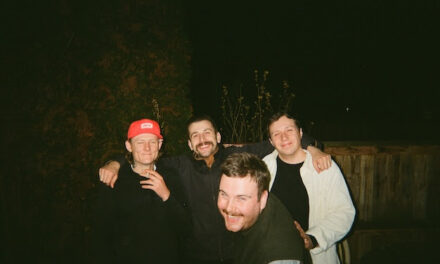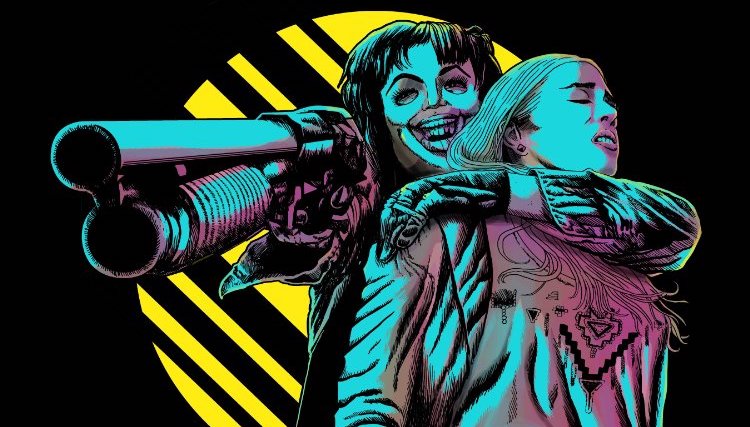Listening to music can be an experience like none other if you fully immerse yourself in it. There is so much music out there and you never know what you may stumble upon. You could find your next favorite band any given day, and you might even find the next blink-182 before, you know, they become massive (just don’t brag about it for the rest of your life). But more importantly than finding a band before they become “cool,” is just connecting with music.
That’s not always easy, and it doesn’t always have to be lyrically. Not every band needs to write thought-provoking, Bukowski quoting lyricists for you to connect with them. It doesn’t hurt if they do, but it’s not a prerequisite. A good example of this would be the EDM community. That is a community certainly not based around lyrics, but yet you cannot deny the connection fans feel with that music can you?
You might be wondering where this is going or what the point of the last two paragraphs is, and that’s fair. So let’s just dive in so it all makes sense.
The Menzingers is a band that has been around for over a decade, but has really started to find their footing over the past eight years. While the band released their debut album, A Lesson in the Abuse of Information Technology, in 2007, most would point to 2010’s Chamberlain Waits as when the band really started to outshine those around them. Light critical acclaim was provided at the time, and by the time On the Impossible Past was released in 2012, most everyone interested in punk music was watching. Rave reviews were coming from all over (as of today, the record holds a 93 on popular rating website Metacritic, the band’s highest score), and the band continued to push forward. A few years go by, countless tours later, and the band returns with 2014’s Rented World. While the album continued to grow their fanbase and really capitalized off the ensuing hype that came from Impossible Past, critics were slightly less welcoming to the record (which currently holds a 71 on Metacritic).
That brings us to 2017’s After the Party, the Menzingers third record on Epitaph Records. A record all about growing old, reflecting your twenties, and wondering where the hell you go when your twenties is over (see album opener: “Tellin’ Lies“). It’s a record that resonated with a lot of people (it was even this writer’s second favorite album of 2017) and immediately sparked a lot of nostalgia amongst their fan base, in a beautifully positive way. Fans and critics (New York Times, Pitchfork, etc.) alike flocked to this record as one that was easy to relate to, lyrically and through all of the imagery littered throughout. While it sparked this immediate positive response, the fanfare for the record hasn’t yet died off or started to fade away. This is something that, during our conversation, guitarist and co-frontman Greg Barnett touched on himself: “The excitement for the record really hasn’t died down much. A year in, you feel like people are ready for something new, that they’re like ‘alright, yeah we’re over it.’ But, I just feel like people are getting more and more excited about [After the Party], which is just unbelievable.”
For a record like After the Party, one that is very much so about reflecting on your past through a nostalgic lens, it’s only fitting that – now that it’s been out for over a year – we reflect on that record with Barnett. When you listen to the record, and it sends you down memory lane, it’s fair to wonder — was this the intention of the record? Barnett explains that this was not intentional from the very beginning, and usually in their experience it takes a few songs to find out where the record is going to head. However, he notes that “As we were going on, it just kind of looked the album was really reflective over the history of the band, and then that theme really developed to ‘wow, we have all spent most of our 20’s in this band, dedicated to this band, our entire life has been this.’ All of the stories just became this thing where it’s like, all of the stories the are gonna fall on this album, they’re reflective on this entire decade of our lives. It was kind of almost like, let’s just tell the story of the band in one album.”
While After the Party is written through the perspective of the Menzinger, four adults looking back on their 20’s, it’s not a record that you have to be 30 or above to enjoy. In fact, only the aforementioned “Tellin’ Lies” directly references the moment of leaving your twenties behind. Theres’s a lot of stories on the album that allow you to place yourself in, whether you are still in your 20’s or even younger — good examples being “Midwestern States,” “Your Wild Years,” and “Lookers” just to name a few. “As the album goes on, the relationships and the real life tends to get a little bit harder,” Barnett explains before specifically highlighting “Livin’ Ain’t Easy” and the title-track. “I think that, as the album progresses, it goes through a lot of the changes that we all have made,” he finalizes.
There’s not much else to say about After the Party that hasn’t already been said by fans, critics, or even the Menzingers themselves. But, part of looking back on your past creative work, is analyzing it through the power of hindsight. On a much smaller scale, sometimes writers can be guilty of this. So it’s always fascinating to hear musicians speak through that same lens, and that’s part of what Barnett and I did during our thirty minute conversation. We start with the positives, and there’s a lot of them, but when asked if there are songs on the record that standout most, Barnett begins with the title-track, “I think it’s, in my mind, almost like a quintessential Menzingers song. I think like, it has such an aggression and a sing-a-long, and these type of lyrics that I’m super proud about; they kind of tell a story.” He then goes on to highlight “Lookers” as “one of the more poppier songs that we’ve ever written” in a positive way, while expressing his excitement for how the rest of the record plays out, as well.
The flip side of that, of course, is improvements on the record. It’s only been about sixteen month since the After the Party was released, and of course there’s no new record, or a collection of songs to compare it to. “There is some lines on the album that like, where as time went on, I’ve been like ‘man, this would have been a better line to put there, this would have hit home harder.’ But, I’ll say that to people – my friends or even bandmates – and they’ll all say ‘no way that line is great,’ but in my head the constant editing gets a little too crazy,” Barnett begins. “I do definitely believe in the idea that sometimes you just have to call it, record it, and it’s done. You’ve gotta stop editing because sometimes you just take away the fun. In my head, yeah, things could always improve and change, but as a whole, the songs were all finished.”
The idea of overanalyzing things – particularly your own art – is nothing new. It’s something that we could wager a lot of artists struggle with, but it’s always interesting to hear how it affects each individual person. When questioned on who helps draw the line between pushing a song to be better and maybe pushing it too far, Barnett acknowledges that most of the time that comes from within. However, he specifically calls out a line on “Toy Soldier” (a stand-a-lone single released in May) that goes “I lost my accent in the plague” where the band had serve as a reminder that the line worked and should not be removed. “While writing lyrics, the songs become so personal to you and it’s hard to sometimes like separate that. You realize this story that’s yours is going to be listened to and interpreted by thousands of people, so the little things that you dwell on to reflect on your own personal life, that isn’t necessary sometimes,” he begins as he explains why this can be hard to do on your own. “Sometimes I’m just like ‘well that doesn’t make sense in the narrative of what happened so I need to switch these lines up’ but then you’re like ‘well, like, it could have happened that way, maybe it would be more interesting if it happened that way.’ So taking creative liberties and editing things to the grander story sometimes makes for a better song.”
When we were reflecting on After the Party, Barnett starts to share what it was like for the Menzingers as a whole during the writing and recording process. He explains it as the “most fun and relaxed” writing process the band has ever had. He compares it to when they were working on Rented World, which was more difficult and sometimes they would struggle to finish a song, but that wasn’t the case working on After the Party. While working on the record, Barnett mentions that “Things just kind of fell out, and we didn’t really fight exactly what was coming out. We just let it happen, and that was really cool. Then the recording process, it was the first time we ever worked with [Will Yip], and it was super intense. We have never done 5 weeks in the studio, 6 days a week for 10 hour days, so that whole process was, like, we learned so much from being in the studio, but it was also very mentally taxing at times because all four of us were so involved all of the time.”
If that sounds a little intense, it’s because it was. But, just leaving it at 10 hour days, 6 days a week for five weeks straight, to really understand the process and what went into After the Party for the Menzingers, we needed to dive a little deeper. For starters, Barnett explains that Yip is especially hard on drummers – being one himself – which made the process especially hard on Menzingers’ drummer, Joe Godino. Barnett highlights that there were times when a drum track would be repeated for hours on end to get it just right in the context of the song, something that could be physically and mentally taxing, at times.
From a vocalist standpoint, Barnett notes how big Yip is on singing and harmonies. “Vocal sessions would be four hours long for one song, and I would just leave the studio with no voice. He really beats up singers as well. Knowing that, I was like ‘oh man, I gotta sing ‘After the Party’ and that’s the hardest song to sing on the album, it’s going to kill me.’ I would dread it all week knowing that Thursday, Friday, and Saturday would be those vocal sessions,” he explains. “He does get the best out of you, which is really cool.” Further expanding on his affection for Yip, Barnett states “[After the Party] couldn’t have sounded the same with anybody else. It had to be him to, you know, push us and direct us in the right way.
Another key difference coming from writing Rented World to writing for After the Party: the Menzingers took some time off of writing to play a handful of shows. “For us, we knew that we wanted to write songs that would translate well live and would be really fun to play live. Going out on the road and thinking about the songs, writing them at soundcheck, and thinking of how they would mix in on the set. Like, ‘hey let’s speed this one up’ or ‘now we want the ballad,’ that really helped as well,” Barnett explains. He notes that right before the writing process, the band did a tour of Europe where they performed at massive festivals, sometimes winding up at the same ones where acts like Kendrick Lamar and Linkin Park, among others, were performing. During this time, the Menzingers would often play early in the afternoon and then spend the rest of the day kicking around ideas with one another, before the process of writing the whole thing even began.
Being isolated in a foreign country away from your family and closet friends can be hard. But, sometimes you can turn things around and make them positive, and that’s exactly what the Menzingers did with this experience. “Most of the time we were just in a field in the middle of nowhere Germany. It’s like, sitting around in a dressing room, pull out a guitar, and start talking about the songs. We’d be talking about ideas, riffs, and then it’s like ‘hey the Offspring is playing, let’s go check them out.’ We had a lot of late night bus drives too, we’d stay up all night, cranking music, talking beers, and talking about it,” Barnett begins before essentially bringing our conversation full circle, “That was, for me, a really defining moment of like ‘we didn’t really talk about that we wanted this to be an album about our twenties, it was more so how we wanted to have this storytelling atmosphere and we started thinking about it that way.”
For the Menzingers, they didn’t know After the Party would turn out to be the record it did: a self-reflective, nostalgic look on your path. There was no way to know what this record would do commercially, or how well it’s songs would resonate with everyone. But this is what we have: an album full of songs that well over a year later, still brings in new fans and is easy to relate to. There’s also no telling what the next record will hold, but maybe that’s not something to worry about right now. Instead, if you haven’t done so yet (or maybe it’s just been a while), give this record a spin – you won’t regret it.
You can find the Menzingers on Twitter, Facebook, and Instagram. They have some European festival appearances for this summer, before heading back to the U.S. for a headlining tour with Tiny Moving Parts and Daddy Issues. Check out all of their upcoming dates here.












